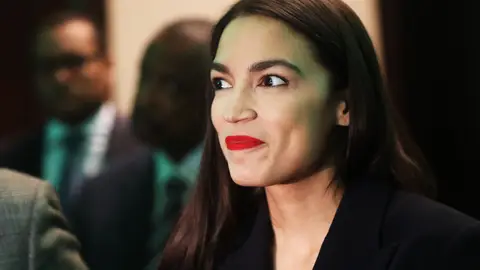College Democrats Are Taking A Stand For The Next AOC

By Christianna Silva
Led by the Harvard College Dems, more than 70 chapters of the College Democrats of America, the youth outreach arm of the Democratic National Committee with over 100,000 college and university members, are boycotting the Democratic Congressional Campaign Committee after the group decided to implement a new policy that would protect incumbents from primary challenges. And the DCCC won’t even meet with the College Democrats over the change.
In early April, the DCCC, a political action committee that works to elect Democrats to the House of Representatives by helping fund their campaigns, announced that it would not grant contracts to pollsters, strategists, or communications specialists working with Democrats who mount challenges to incumbents in 2020 – virtually blacklisting an entire group of political reformers, who tend to be progressive.
“I think this DCCC move [is] really a move to consolidate power and remove the structures that have allowed people to hold politicians accountable,” Jeremy Stepansky, the legislative director of the Harvard College Dems told MTV News of the DCCC’s proposed policy. “I think it is absolutely essential that they listen to young people.”
College Democrats can make or break an election. They're one of the largest groups of people who canvass and phone-bank for candidates, they do massive voter-registration drives on college campuses, and they're a pipeline for future campaign managers, staffers, and politicians.
Some Democratic leaders think the new DCCC policy could make it easier for Democrats to take leadership of the U.S. government. House Speaker Nancy Pelosi told the Washington Post that she largely supports the DCCC’s policy, saying her “focus is strictly on winning the election and to putting our resources where it will win the election for the American people.”
But other Democrats aren’t so sure. New York Congresswoman Alexandria Ocasio-Cortez suggested that her over-four million Twitter followers donate to individual candidates rather than to the DCCC, and for good reason: If this policy was in place in 2018, it could have impacted her run against incumbent Democrat Joe Crowley. It also could have stopped the successful challenges mounted by California Congressman Ro Khanna and Massachusetts Congresswoman Ayanna Pressley.
Ocasio-Cortez’s protest was one of the reasons the College Democrats felt empowered to boycott the DCCC. This is one of the first times that the College Democrats have leveraged such a massive boycott against the DCCC.
“I think [Pressley and Ocasio-Cortez’s] advocacy was kind of the genesis of this campaign,” Stepansky told MTV News. “As College Democrats, we have a responsibility to use our platform to hold people in power accountable. And we hope that a coalition of college democrats rallied around this call to boycott will send a collective message to DCCC that young people and their base won't tolerate their attempt to [control the outcome of] these races whose [candidates] are often from historically marginalized communities that we should be really trying to elect.”
Unsurprisingly, the DCCC isn’t budging to progressives asking for their policy to not be implemented; according to New York Magazine, “protecting incumbents is a core part of [DCCC’s] mission,” given that incumbents tend to win elections at higher rates than political newcomers. What is surprising, is that the leaders of the DCCC don’t seem to be taking College Democrats seriously, Hank Sparks, the president of the Harvard College Democrats, told MTV News, as the DCCC is still refusing to meet with the group. DCCC also did not respond to a request for comment from MTV News.
Many people feel that the DCCC would be remiss to not take young people seriously, as the group has proven time and time again how committed they are about making themselves heard. For instance, last year, Harvard College Democrats knocked on thousands of doors on behalf of Jared Golden in Maine's second congressional district. He won by just one percentage point.
“College Democrats across the country have a huge, huge electoral impact,” Sparks told MTV News. He added that the Democratic party is being elevated by younger leaders like Ocasio-Cortez and Pressley, but that these young leaders tend to push the party to the left and cause some establishment and centrist politicians worried about electability. “I think the DCCC is scared of us and I think that they need to be,” he added.
College Democrats plan on continuing to fight to have their voices heard. If the DCCC doesn’t respond to their boycott with a meeting, Stepansky says they plan to continue “increasing the size of the coalition [and] also potentially I think contacting major donors and seeing if they would sign onto the boycott in solidarity... I don't know if we're going to take those steps, but I think those kind of actions would be helpful in increasing the pressure on DCCC.”
The group also plans to continue their work in helping elect Democrats, whether or not they’re running against incumbents. For instance, Pennsylvania College Democrats are still calling on behalf of Marie Newman, a Democrat challenging long-time incumbent Daniel Lipinski in Illinois's third congressional district. Kelsey Denny, the president of the Pennsylvania State College Democrats, told MTV News that Newman is one of the reasons her group of College Democrats felt compelled to join this boycott.
“When the DCCC is defending these incumbents and not allowing vendors to help any new voices in the party, it's just kind of maintaining this old structure that is completely outdated and it doesn't allow these new and sometimes marginalized voices to come up in the party,” Denny said, adding: “We believe that having those bases and having support for people who are new to the party is absolutely crucial to the success of the party.”





